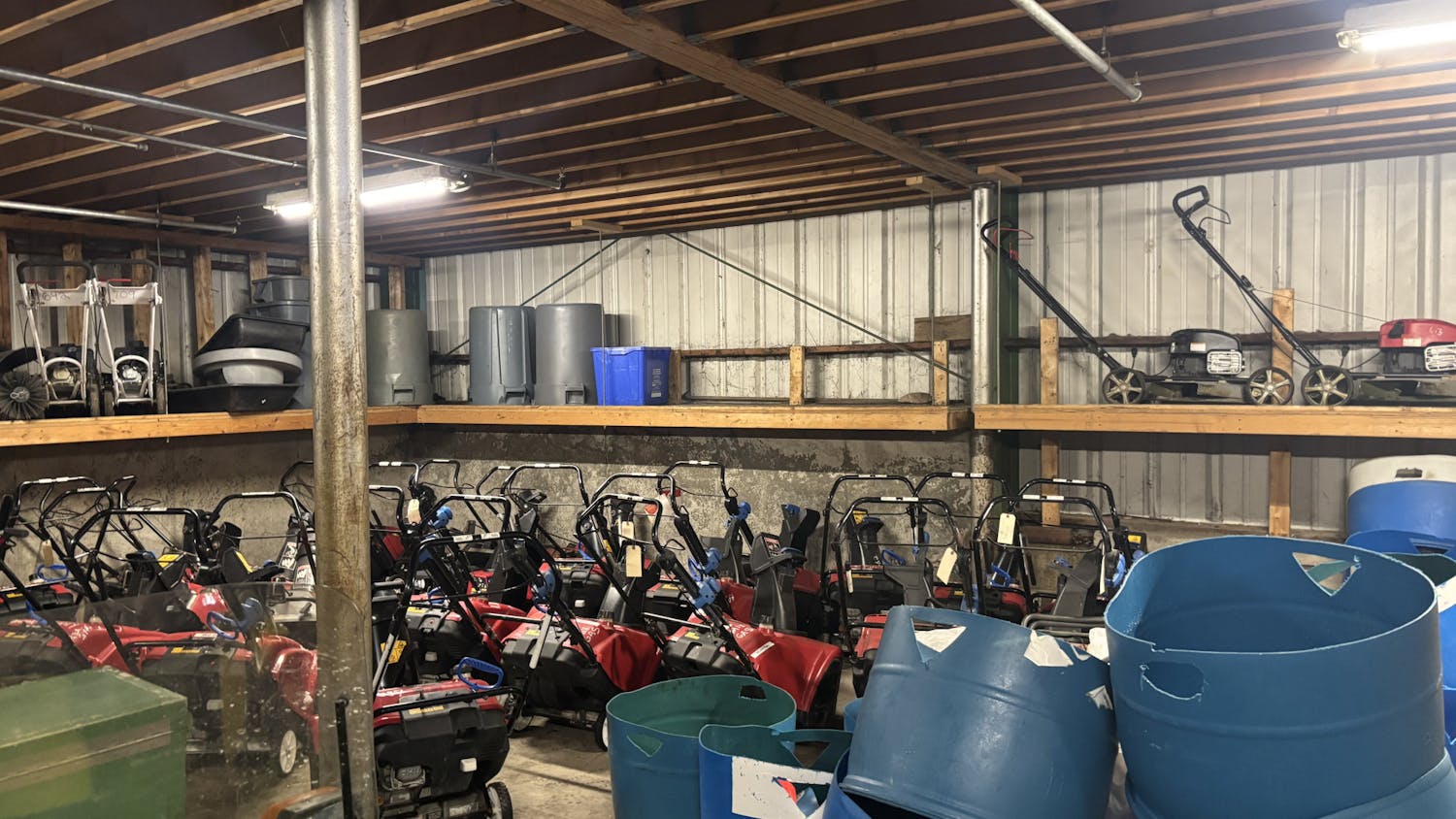The Addison County state’s attorney race is a battle of the husbands. Democratic incumbent Dennis Wygmans is the spouse of Nicole Curvin, director of admissions and coordinator of multicultural recruitment at the college. His independent challenger, Peter Bevere ’96, is the spouse of Kelly Bevere ’99, who works as the college’s assistant athletic director and softball team head coach.
Lawn signs supporting each candidate have popped up around Addison County — and, in a reflection of the candidates’ college ties, in the window of at least one campus dorm.
THE INCUMBENT
Two years ago, Wygmans was appointed to the role of state’s attorney by then Governor Peter Shumlin, after his predecessor was appointed to the Vermont Superior Court.
After graduating from the University of Vermont, Wygmans took a unique path to becoming a lawyer, something he had always known he wanted to do. In 1993, he and his brother opened Club Toast, a live music venue in Burlington. The club eventually shut its doors in 1998, but the lessons Wygmans learned while working there still influence him.
“It informed me a great deal about what makes people tick,” he said in an interview with The Campus. “I consider people’s motives and think about ways we can address the underlying issues in a more complete way.”
After the club closed down, Wygmans moved to Massachusetts to attend law school at Seton Hall University School of Law.
Prior to his appointment as state’s attorney, Wygmans worked as a deputy state’s attorney in both Addison and Chittenden counties, prosecuting many sexual and domestic violence cases. On several occasions, he tried cases involving the college, including two high profile rape cases, though Wygmans said he does not interact as much with the college in his current job.
“It is a pretty peaceful campus generally,” he said.
Wygmans said he sees mass incarceration as not only a national issue, but one he must address in his role. He said he learned early on that jail is not always the right solution, describing it as a “monolithic approach to criminal justice.” Wygmans is looking to pursue more options, including rehabilitative housing, a system that has been proven to be effective in other states.
“Creating rehabilitative housing allows for people to be sentenced to where they can be in the community, where their treatment provider is already, and they don’t have to have an interruption in treatment, where they don’t have to lose their job, and they certainly lose contact with their family,” he said.
Wygmans also addressed the fact that Vermont incarcerates African American men at a higher rate than any other state in the country. He often uses a system of charging blind, a process in which he does not know the race of each defendant until afterwards.
“This is more than just a prosecutor’s problem, this is a society- and community-wide problem,” he said. Judges play a large role in the mass incarceration of African Americans, yet their sentencing data is rarely reviewed. Additionally, the penalties the legislature chooses to place on certain crimes disproportionately affect African Americans.
“The blame is to be passed around amongst us all,” he said.
Wygmans cited the opioid crisis as another frustrating issue. During his time in the state’s attorney’s office, Wygmans has advocated for a treatment court, a voluntary program that helps users recover and offers defendants a path to having their criminal charges reduced or dismissed. To maximize funding, Wygmans developed one in conjunction with Chittenden County.
Wygmans also wants to rethink how mental illness is approached in the criminal justice system. “Instead of engaging prosecutors we should be engaging practitioners in these areas,” he said. This would ensure that the treatment assigned is appropriate and addresses the dangers facing the individual.
Wygmans also discussed practicing restorative justice.
“When you go into a restorative justice model, the victim has an immediate say in what they want to have happen as far as resolution is concerned, within reason,” he said. This often allows for both a more productive and just process. He has partnered with restorative justice programs in Addison County to find more effective methods for promoting justice.
“My job is to make sure that people don’t come back,” he said.
A “firm believer in second chances,” Wygmans stressed that individuals’ mistakes should not ruin their lives forever. For example, he believes in creating pathways for expungement, a way for people to find a fresh start.
“Justice means that at some point you have paid your debt to society,” he said.
THE CHALLENGER
Bevere has long been interested in the job of Addison County state’s attorney. Currently the Chief Deputy State’s Attorney in Rutland County, Bevere has worked as a prosecutor for 12 years.
“I have experience in almost everything there is to handle in a criminal courtroom,” he said in an interview with The Campus. During his time, he has seen serious felonies, handled numerous homicides and, in his current position, works many cases of sexual assault and the physical abuse of children.
Bevere generally considers himself politically independent.
“I don’t like to be boxed into one party’s position or the other,” he said, adding that he views the state’s attorney job in similar terms. “It’s not our job to make the law, it’s our job to make sure it’s being fairly and equally enforced.”
As an alumnus of the college and the spouse of a college employee, Bevere interacts with the school on a regular basis. He spends time with the softball and football teams, the latter of which he played for as a student. And he has taught a Winter Term course called “The Trial of Jon Snow: An Intro into the Criminal Justice System.”
In the window of one of the college’s Ridgeline townhouses, student residents have placed a sign supporting Bevere’s campaign. Irene Margiotta ’19, a softball team captain, lives in the house with another team captain.
“Peter is a great guy, always super supportive of the team and is always willing to help out,” Margiotta said. Bevere often attends games and spends time on the sidelines with the players’ families. “We just think he’s a real stand-up guy,” she said.
“As state’s attorney, I would like to have, and think I could have, the ability to work closely with the college,” Bevere said. He believes it is important for the college and the state’s attorney’s office to maintain a strong relationship.
“I want to continue to be a strong voice for Addison County and make sure that Addison County is not to be overlooked by some of the larger counties,” he said. This means getting deputies and victim advocates the resources and support they need.
In sexual violence cases, Bevere discussed his “victim-centered approach.
“I always emphasize that we’re never going to do anything that they don’t want to do,” he said.
Bevere noted that the decision of whether to report sexual violence, and subsequently pursue legal action, is completely up to the survivor.
“It’s not about re-victimizing them just to hold someone accountable,” he said.
On issues of racial bias, Bevere believes that the state has made great strides in addressing the state’s disproportionate incarceration of African American men.
“I think as state’s attorney it’s important that we’re looking at cases and we’re being fair and impartial, as to what we’re charging and that we’re consistent,” he said.
Bevere recognized that mental health plays a significant role in criminal justice.
“What is shocking to me is the number of victims of crime that I’ve come across who have mental health issues, and the lack of resources that are available to them,” he said.
Throughout his time as a prosecutor, Bevere has come to see justice as a balancing act.
“You have to balance your communities need for protection, and a victim’s need for protection,” he said. For this reason, Bevere supports the use of restorative justice programs, especially in relation to treating the opioid crisis.
Bevere sees aiding children as his most important work. He often works with children who are victims of physical or sexual violence.
“Those kids come up to you and say, ‘Thank you for believing me,’ because not everybody does,” he said. “This is why I do this.”
Bevere’s campaign is centered around two main ideas, beginning with the diversity of his experience. “I think that it’s important that your state’s attorney has experience in just about everything there is to experience,” he said. Compared to Wygmans, Bevere said, “I bring more experience to the table.”
Second, Bevere is focusing on his residence in Addison County. In Vermont, state’s attorneys do not need to live in the same county they serve in public office. But Bevere, who lives in Middlebury, has made an issue of Wygmans’s residence in Chittenden County.
“I’m the only candidate that’s from Addison County, and I have a family I am raising here, friends here, I have a vested interested in the well-being of our county, our community,” Bevere said.
Wygmans has pushed back on Bevere’s claims. Having grown up in rural Vermont, Wygmans feels that he has a great understanding of what life is like in Addison County. Additionally, having worked in Addison County for six years, Wygmans believes he has fostered the relationships necessary to perform the job.
Just because he does not live in the county, Wygmans said, does not mean he does not care about it.
“I am on the scene when people die in car accidents, I am on the scene when people OD,” he said.
“It’s hard to say what my opponent actually stands for,” Wygmans said, adding that Bevere has chosen to focus on each candidate’s residency, rather than the issues.
“I want to talk about what we can do to make Addison County a safer place, but also a place that addresses the issues head on,” he said. “And all he wants to talk about is being a local guy.”
Two Candidates with College Ties Battle in State's Attorney Race

Comments



